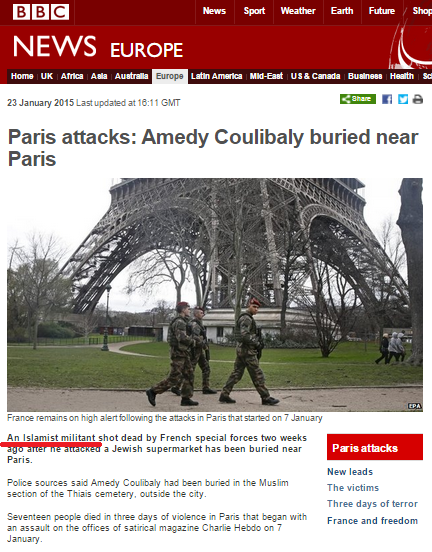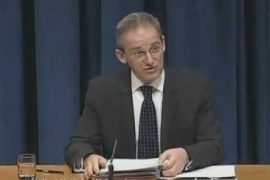Readers no doubt recall the Tweet below which was sent by the BBC’s Middle East editor Jeremy Bowen whilst he was covering the Israeli prime minister’s speech to the US Congress on March 3rd 2015.
A member of the public who made a complaint on that matter has received a response from the Complaints Director at the BBC’s Editorial Complaints Unit – Richard Hutt – which includes the following:
“You have said that this was profoundly offensive and served to trivialise the Holocaust. Reviewing the tweet it did not seem to me that Mr Bowen was referring to the Holocaust as a mere political card to be played, but rather suggesting this is what Mr Netanyahu was doing. I would accept that this is a fine distinction, and one which the medium may not be best suited to convey. However, the sense I took from it was that Mr Bowen felt Mr Netanyahu had introduced the Holocaust in reference to Iran as a means of influencing the decisions of America’s policy makers about that country. Earlier in Mr Netanyahu’s speech he had drawn direct parallels between Iran and Nazi Germany and in his acknowledgement of Elie Wiesel he returned to that comparison – referring to “dark and murderous regimes” and saying that:
And I wish I could promise you, Elie, that the lessons of history have been learned. I can only urge the leaders of the world not to repeat the mistakes of the past.
The characterisation of those references and that comparison (between Iran now and Nazi Germany in 1938) as the playing of a card does not itself serve to demean the Holocaust or reduce it to a political tool. In fact, accusing another of doing so might suggest quite the opposite.
Some who complained about the tweet have said that it offers evidence of bias, and that the facts regarding Iran support Mr Netanyahu’s decision to bring the holocaust [sic] into the discussion. I appreciate that it might be argued that the denial of the Holocaust by some in Iran, coupled with their belligerence regarding Israel, makes Mr Netanyahu’s reference appropriate. Conversely, some have pointed to profound differences between Iran now and the Nazi state in 1938. It is not, however, for me to pass judgement on the extent to which this reference was apposite, but only on whether Mr Bowen’s characterisation of it amounted to a breach of the BBC’s standards. I cannot say I think it was. The BBC’s guidelines do not prevent correspondents from using their judgement in characterising events and offering their knowledge and experience to offer informed perspectives on them – and this, it seemed to me, was what happened here.
I would accept that this might have been better worded. However, this was not an in-depth article but a single tweet, one of many published over the course of a live event, and the necessary brevity of that format makes extra background impossible – a limitation which I think audiences understand and a context in which it must be judged. I don’t think anyone would look to the tweet for a full understanding of the nuances of the situation in Iran or the speech as a whole but rather a (live) shorthand summary of one aspect of it, as analysed by Mr Bowen. His analysis reflected his particular interpretation of Mr Netanyahu’s comments but as I say such interpretation is allowed and indeed expected of correspondents, particularly from their own Twitter accounts. I don’t therefore believe this amounted to bias.
The BBC’s guidelines do not promise that content will never offend. They do however require that where it might, some editorial justification exists. In this case, I think the informed analysis I describe above would offer that justification, and as I say I do not think this served to belittle the Holocaust in any way. While I recognise and regret that you found this offensive I do not believe it is in breach of the BBC’s standards.”
As was noted here at the time:
“The accepted definition of the idiom ‘play the card’ is to exploit a specific issue for political advantage. In other words, Bowen is accusing Netanyahu of cynically making use of the memory of six million murdered Jews for his own political gain and his use of the words “once again” indicates that Bowen is of the opinion that this is a regular practice on the part of the Israeli prime minister.”
The BBC, it seems, would have us believe that is an ‘informed perspective’ which has “editorial justification”.
Related Articles:
BBC audiences get Israeli PM’s Congress speech through the Bowen filter – part one





